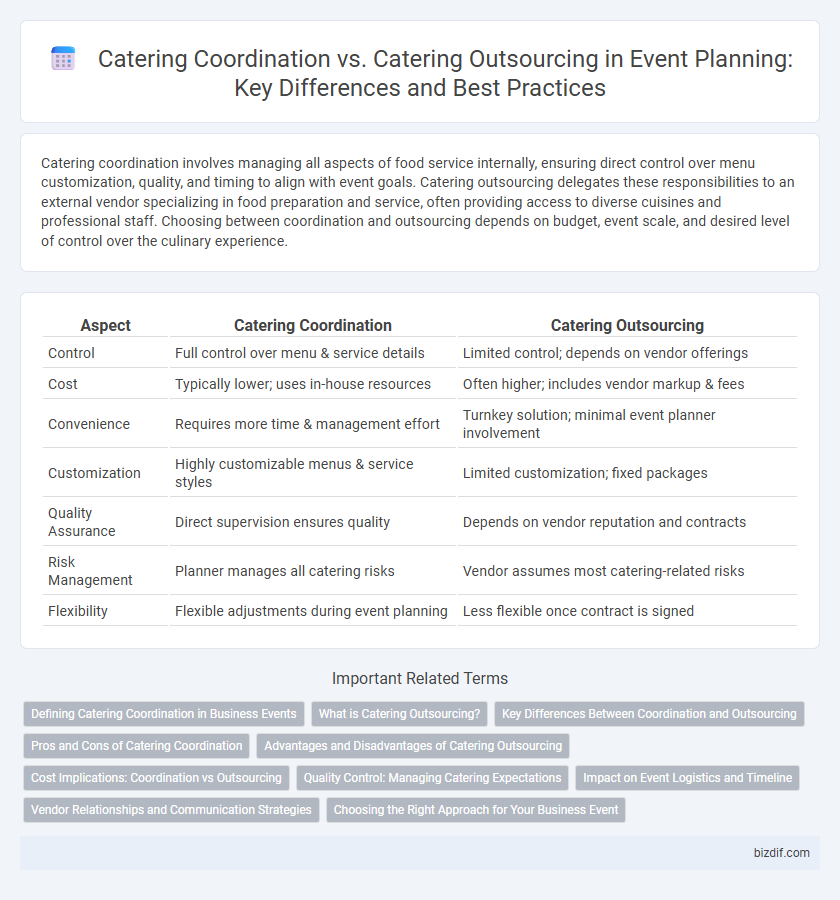Catering coordination involves managing all aspects of food service internally, ensuring direct control over menu customization, quality, and timing to align with event goals. Catering outsourcing delegates these responsibilities to an external vendor specializing in food preparation and service, often providing access to diverse cuisines and professional staff. Choosing between coordination and outsourcing depends on budget, event scale, and desired level of control over the culinary experience.
Table of Comparison
| Aspect | Catering Coordination | Catering Outsourcing |
|---|---|---|
| Control | Full control over menu & service details | Limited control; depends on vendor offerings |
| Cost | Typically lower; uses in-house resources | Often higher; includes vendor markup & fees |
| Convenience | Requires more time & management effort | Turnkey solution; minimal event planner involvement |
| Customization | Highly customizable menus & service styles | Limited customization; fixed packages |
| Quality Assurance | Direct supervision ensures quality | Depends on vendor reputation and contracts |
| Risk Management | Planner manages all catering risks | Vendor assumes most catering-related risks |
| Flexibility | Flexible adjustments during event planning | Less flexible once contract is signed |
Defining Catering Coordination in Business Events
Catering coordination in business events involves managing all aspects of food and beverage service on-site, ensuring menu selections, dietary restrictions, and timing align with the event schedule. This hands-on approach requires close collaboration with in-house staff and vendors to oversee deliveries, setup, and service quality. Effective catering coordination enhances guest experience by maintaining seamless communication and prompt problem-solving throughout the event.
What is Catering Outsourcing?
Catering outsourcing involves hiring an external professional catering company to handle all food and beverage services for an event, ensuring specialized expertise and a wide menu selection. This approach reduces the event planner's workload by transferring responsibilities such as menu planning, food preparation, delivery, and serving to the outsourced caterer. Outsourcing catering often leads to higher efficiency, cost-effectiveness, and access to experienced culinary teams compared to managing in-house catering coordination.
Key Differences Between Coordination and Outsourcing
Catering coordination involves managing all aspects of food service within an event, including menu selection, vendor communication, and on-site supervision, ensuring seamless integration with the overall event plan. Catering outsourcing delegates these responsibilities to an external specialized catering company, allowing event planners to focus on other logistical elements while relying on the caterer's expertise and resources. Key differences include the level of control, cost implications, and flexibility, where coordination offers more customization and hands-on involvement and outsourcing provides efficiency and reduced workload.
Pros and Cons of Catering Coordination
Catering coordination in event planning offers precise control over menu selection, vendor communication, and quality assurance, ensuring the event aligns perfectly with the host's vision and dietary requirements. This approach demands significant time, logistical expertise, and resource management, which can increase stress and the risk of oversight. However, it often results in cost savings and customized solutions compared to catering outsourcing, where chefs and service teams are hired externally but may have less flexible options and higher expenses.
Advantages and Disadvantages of Catering Outsourcing
Catering outsourcing offers event planners the advantage of access to specialized culinary expertise and extensive menu variety without the need to manage in-house kitchen staff, reducing overhead costs and logistical complexity. However, it can pose challenges such as less control over service quality and timing, potential communication gaps, and dependency on external vendors' reliability. Outsourcing also limits customization flexibility compared to in-house catering coordination, which may impact guest experience at high-profile events.
Cost Implications: Coordination vs Outsourcing
Catering coordination typically involves direct management of food services within the event planning team, often resulting in lower upfront costs but added responsibilities and potential hidden expenses. Outsourcing catering transfers the entire food service to specialized vendors, which may increase overall costs but offers predictable budgeting and professional quality assurance. Businesses must evaluate factors such as event size, complexity, and in-house expertise to determine whether cost savings from coordination outweigh the convenience and reliability of outsourcing.
Quality Control: Managing Catering Expectations
Catering coordination allows direct oversight of food quality, presentation, and service, ensuring alignment with event standards and guest expectations. In contrast, catering outsourcing relies heavily on the vendor's professionalism and consistency, making detailed contracts and clear communication essential for maintaining quality control. Effective management of catering expectations requires continuous monitoring, feedback loops, and contingency planning to prevent service disruptions.
Impact on Event Logistics and Timeline
Catering coordination involves direct management of menu selection, vendor communication, and onsite setup, allowing for seamless integration with event logistics and tighter control over the timeline. Catering outsourcing delegates these responsibilities to an external provider, reducing internal workload but potentially introducing delays due to reliance on third-party scheduling and less direct oversight. Effective coordination ensures timely delivery and adaptability during the event, whereas outsourcing demands clear contracts and contingency planning to mitigate risks of timing conflicts.
Vendor Relationships and Communication Strategies
Effective catering coordination requires building strong vendor relationships through consistent communication, clear expectations, and collaborative problem-solving to ensure event success. Catering outsourcing often relies on established vendor networks, minimizing direct communication but necessitating trust in third-party management for seamless service delivery. Prioritizing transparency, regular updates, and feedback loops enhances reliability and quality in both coordination and outsourcing approaches.
Choosing the Right Approach for Your Business Event
Catering coordination involves managing food service internally, allowing greater control over menu customization, vendor relationships, and client preferences, which suits businesses requiring a tailored guest experience. Catering outsourcing delegates food service responsibilities to specialized vendors, providing access to expert culinary services, scalability for large events, and reduced logistical burdens. Selecting the right approach depends on event size, budget constraints, desired control level, and the importance of a personalized dining experience for attendees.
Catering coordination vs Catering outsourcing Infographic

 bizdif.com
bizdif.com